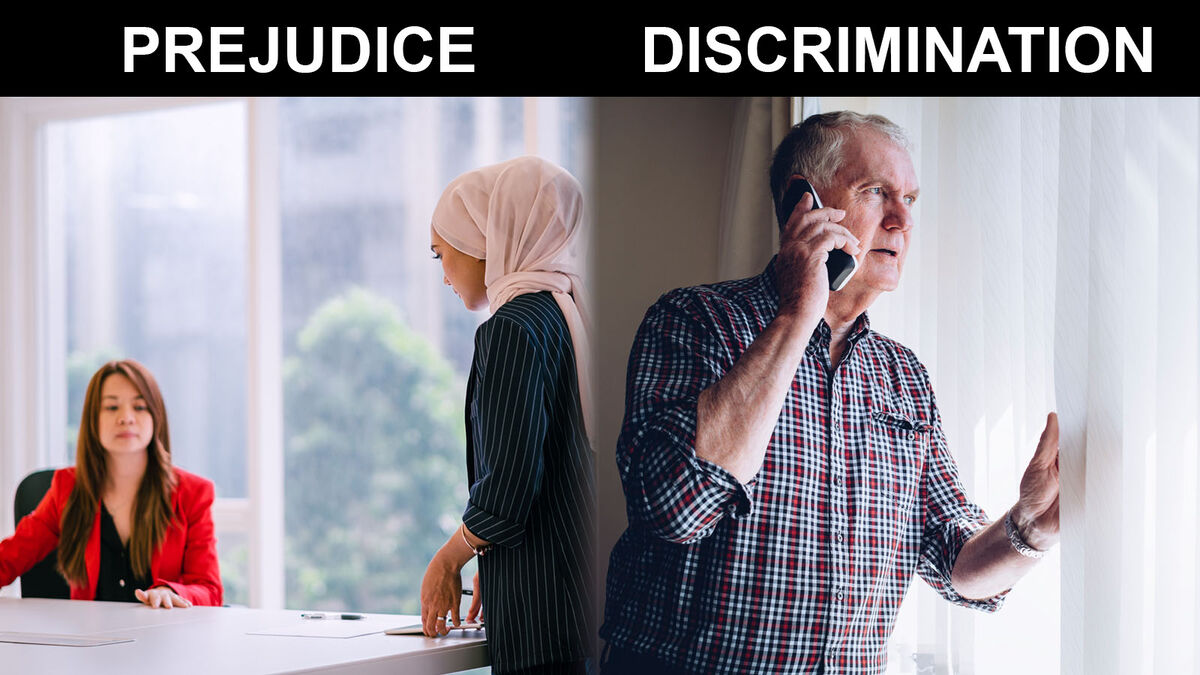
Both prejudice and discrimination involve treating another person unfairly. But do you know the difference between the meaning of these terms? Keep reading to find how prejudice and discrimination vary, and how knowing the difference can affect your future.
Prejudice and Discrimination Defined
When applied to the idea of treating people equally, prejudice and discrimination have negative connotations. They both involve an attitude of bias against a group of people. However, there is a key difference between these words.
Here are their definitions:
- prejudice (n) - a preconceived opinion based on prior beliefs instead of facts
- discrimination (n) - the act of treating someone unequally based on a perceived difference
Prejudice only exists inside a person’s head. Discrimination is how they apply their prejudice to a group of people. Being prejudiced is not a crime, but acting on it by discriminating against a class of people is illegal.
Discriminating can also be a synonym for discerning. For example, a food critic can have a discriminating palate for wine. But in the context of society and biased attitudes, it describes how a person separates other groups of people based on their own prejudice.
What is Prejudice?
Prejudice means “pre-judged.” A person who has prejudiced opinions relies on stereotypes. When meeting someone with a different background from themselves, they may believe they already know everything about that person. However, their prejudice alters their perception and prevents them from learning more.
Some examples of prejudice include:
- Not believing a customer can afford an expensive item because they are a different race
- Assuming that a woman can’t handle the pressure of a high-stress job as well as a man
- Believing that an older person doesn’t understand technology
- Seeing a person of color and assuming that they have committed a crime
- Believing unfavorable stereotypes about someone who practices a different religion
- Not wanting to hire someone with a disability because you think they can’t do the job
- Being uncomfortable around a gay person because of your own beliefs
Notice that none of these situations are based on evidence. Our prior experiences, societal expectations, and life situations work to form prejudices that we may not even know about. That’s why it’s important to recognize our own prejudices in any given situation. Exercising prejudice can lead to discrimination, which can limit opportunities and denies people their civil rights.
What is Discrimination?
Discrimination occurs when a person allows their prejudice to influence their behavior. Discrimination against protected classes is illegal in most cases, as it can violate a person’s civil rights. Here are some examples of discrimination from the prejudice scenarios above:
- Asking a customer to leave the store because you believe they can’t afford to shop there due to their race
- Promoting a man instead of a woman because you believe a man can handle a high-stress position better
- Not including an older employee on an email chain because you assume they can’t handle technology
- Calling the police because you assume a person of color in your neighborhood has committed a crime
- Preventing a person who practices a different religion from entering your place of business based on stereotypes that you believe about them
- Passing over a qualified person who has a disability in a job search and choosing a less qualified person instead
- Not inviting a gay classmate to a party because you believe stereotypes about homosexuality
These types of discrimination all include actions, such as asking someone to leave or calling the police based on your suspicion about their race. These actions directly result in lost opportunities and are based on prejudicial thoughts. Most of all, they unfairly exclude people from society based on incorrect stereotypes.
Your Civil Rights
Prejudice and discrimination can’t exist without each other. If you have a prejudiced mindset, you’re more likely to discriminate against people who are different than you. Discrimination can’t occur without those prejudiced thoughts. Learn more about the negative consequences of prejudice and discrimination with an article that lists examples of civil rights. You might also want to explore some facts about the Salem witch trials.